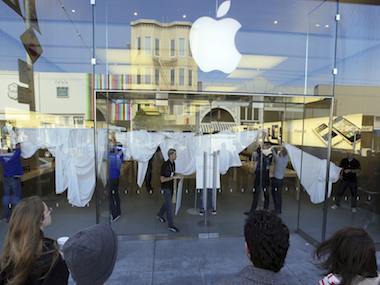Apple is one of the few companies in the world that is willing to disrupt its own business, and that is the main reason why it now sits not only atop the tech world but is in an elite league of global companies. Apple’s iPod became synonymous with digital music players after its launch, but Steve Jobs realised that the days of the mobile music player were numbered as smartphones became the single digital device that people would carry. In 2007, Steve Jobs disrupted not only his business but the order of the mobile phone industry with the launch of the iPhone. Just look at the results Apple announced, and you’ll see the impact of this move. While iPod sales were down 21%, iPhone sales were up a stunning 128%. Most companies would have milked the iPod until it was well and truly past its prime. [caption id=“attachment_193743” align=“alignleft” width=“380” caption=“Apple employees take down a curtain as the store prepares to open in the Marina neighborhood in San Francisco, Oct. 19, 2011. NYTimes”]  [/caption] Businesses as usual, like Kodak or the newspaper industry in the West , hold their cash cows in a deadly embrace of decline. Apple is one of the few that understands that change and disruption are constant in the technology world. Certainly other technology companies and technology leaders understand this. In the late 1990s, when Bill Gates was testifying in anti-trust hearings in the US, trying to defend the empire that he had built, he constantly expressed the fear that the next generation of entrepreneurs in a garage – or more likely as grad students at Stanford – would topple Microsoft. He wasn’t half wrong. As he was testifying, Sergey Brin and Larry Page were building Google. Microsoft is a good example of why it’s so difficult to do what Apple does. Microsoft knew that its cash cows – Windows and Office – were starting to stall in terms of growth. They knew that they needed new markets to conquer if they wanted to continue their meteoric growth. Microsoft has tried to move into television set-top boxes, mobile phones and digital music players. The only real success they have is the Xbox, and even that isn’t nearly as dominant or as profitable as Windows. Bill Gates had the feverish urgency that Steve Ballmer lacks. Steve Jobs had that urgency too, which is why his loss will be felt so acutely by the company he founded. Many tech visionaries have the ability to peer into the new future and anticipate products. Few have the tenacity to bring that vision to market and fewer still have the sense of timing that Jobs developed. Apple isn’t first to market, but Steve Jobs saw opportunities where others didn’t. The iPhone was in development for two years before it launched in 2007. Nokia, RIM and others were in the smartphone business years ahead of Apple, but in a few short years Apple and then Google have completely up-ended that market. Microsoft started promoting its tablet PC in 2001, but it was Apple almost a decade later that created what we now think of as the tablet, conceiving it as a mobile device rather than as a computer in a new form. Kodak, Nokia, RIM and Microsoft all know how difficult it is to not only see the future but build it and bring it to market. It’s as much about creating a corporate and business culture as it is about being a forecaster of the future. 2012 will be Apple’s first full year without Steve Jobs. To continue its success, it needs to fiercely hold onto one legacy from its founding father, that fearlessness to challenge its own current successes. They don’t compete with other companies so much as they constantly compete with themselves.
To continue its success, it needs to fiercely hold onto one legacy from its founding father, that fearlessness to challenge its own current successes. They don’t compete with other companies so much as they constantly compete with themselves.
Advertisement
End of Article


)

)
)
)
)
)
)
)
)



